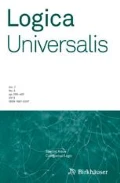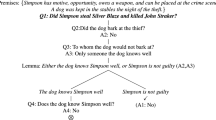Abstract
Jaakko Hintikka (1929–2015) points out the power of Skolem functions to affect both what there is and what we know. There is a tension in his presupposition that these functions actually extend the realm of logic. He claims to have resolved the tension by “reconstructing constructivism” along epistemological lines, instead of by a typical ontological construction; however, after the collapse of the distinction between first and second order, that resolution is not entirely satisfactory. Still, it does throw light on the conceptual analysis Hintikka proposes.
Similar content being viewed by others
References
Auxier, R.E., Hahn, L.E. (eds.): The Philosophy of Jaakko Hintikka. In: The Library of Living Philosophers, vol. XXX. Open Court, Chicago and La Salle (2006)
Barwise, J.: On branching quantifiers in English. J. Philos. Log. 8, 47–80 (1979)
Cook, R., Shapiro, S.: Hintikka’s revolution: the principles of mathematics revisited. Br. J. Philos. Sci. 49, 309–316 (1998)
Dummett, M.: Truth and Other Enigmas. Duckworth, London (1978)
Dummett, M.: The Seas of Language. Clarendon, Oxford (1993)
Enderton, H.B.: Finite partially-ordered quantifiers. Zeitschrift für mathematische Logik und Grundlagen der Mathematik 16, 393–397 (1970)
Fine, T.L.: Theories of Probability: An Examination of Foundations. Academic Press, New York (1973)
Frankfurt, H.G. (ed.): Leibniz: A Collection of Critical Essays. Anchor Books, Garden City (1972)
Gödel, K.: Russell’s mathematical logic. In: Schilpp, P.A. (ed.) The Philosophy of Bertrand Russell. Library of Living Philosophers, vol. V, pp. 123–153. Northwestern University, Evanston (1944). Reprinted in: Feferman, S., et al. (eds.) Collected Works. Volume II. Publications 1938–1974, pp. 102–141. Oxford University Press, Oxford and New York (1990)
Henkin, L.: Some remarks on infinitely long formulas. In: Infinitistic Methods, pp. 167–183. Pergamon Press, Oxford; Warsaw, PAN (1961)
Hintikka, J., Kulas, J.: The Game of Language: Studies in Game-Theoretical Semantics and Its Applications. D. Reidel, Dordrecht and Boston (1983)
Hintikka, J.: Knowledge and Belief. In: An Introduction to the Logic of the Two Notions. Cornell University Press, Ithaca and London (1962)
Hintikka, J.: Leibniz on plenitude, relations, and the ‘reign of law’. In: [8], pp. 155–190 (1972)
Hintikka, J.: Logic, language-games, and information. In: Kantian Themes in the Philosophy of Logic. Clarendon, Oxford (1973)
Hintikka, J.: Models for modalities. In: Selected Essays. D. Reidel, Dordrecht (1969)
Hintikka, J.: Form and content in quantification theory. Acta Philos. Fennica 8, 7–55 (1955)
Hintikka, J.: Quantifiers vs. quantification theory. Linguist. Inq. 5, 153–177 (1974)
Hintikka, J.: The Principles of Mathematics Revisited. Cambridge University Press, Cambridge (1996)
Hintikka, J.: Which mathematical logic is the logic of mathematics? Log. Univers. 6, 459–475 (2012)
Hintikka, J., Sandu, G.: Game-theoretical semantics. In: van Benthem, J., ter Meulen, A. (eds.) Handbook of Logic and Language. Elsevier, New York (1996)
Hintikka, J., Vilkko, R.: Existence and predication from Aristotle to Frege. Philos. Phenomenolog. Res. 73, 359–377 (2006)
Hodges, W.: A Shorter Model Theory. Cambridge University Press, Cambridge (1997)
Hodges, W.: Compositional semantics for a language of imperfect information. Log. J. IGPL 5, 539–563 (1997)
Hodges, W.: Review of the principles of mathematics revisited. J. Log. Lang. Inf. 6, 457–460 (1997)
Ishiguro, H.: Leibniz’s theory of the ideality of relations. In: [8], pp. 191–213 (1972)
Kanamori, A.: The empty set, the singleton, and the ordered pair. Bull. Symb. Log. 9, 273–298 (2003)
Martin-Löf, P.: The definition of random sequences. Inf. Control 6, 602–619 (1966)
Martin-Löf, P.: On the notion of randomness. In: Kino, A., Myhill, J., Vesley, R.E. (eds.) Intuitionism and Proof Theory. North-Holland, Amsterdam (1970)
Quine, W.V.: Reply to Professor Marcus (1962). Reprinted as Essay 16. In: The Ways of Paradox and Other Essays, Rev. edn, pp. 177–184. Harvard University Press, Cambridge (1976)
Quine, W.V.: Word and Object. MIT Press, Cambridge (1960)
Quine, W.V.: Replies. In: Davidson, D., Hintikka, J. (eds.) Words and Objections: Essays on the Work of W. V. Quine. D. Reidel, Dordrecht (1969)
Quine, W.V.: Philosophy of Logic, 2nd edn. Harvard University Press, Cambridge (1986)
Schnorr, C.P.: Zufälligkeit und Wahrscheinlichkeit. Springer, Berlin (1971)
Tait, W.: The Provenance of Pure Reason: Essays in the Philosophy of Mathematics and Its History. Oxford University Press, New York (2005)
Tennant, N.: Games some people would have all of us play. Philos. Math. 3(6), 90–115 (1998)
Väänänen, J.: Dependence Logic: A New Approach to Independence Friendly Logic. Cambridge University Press, Cambridge (2007)
Velleman, D.J.: Review of the principles of mathematics revisited. Mind 108, 170–179 (1999)
Walkoe Jr., W.J.: Finitely partially-ordered quantification. J. Symb. Log. 35, 535–555 (1970)
Wang, H.: A survey of Skolem’s work in logic. In: Skolem, T., Fenstad, J.E. (eds.) Selected Works in Logic, pp. 17–52. Scandinavian University Books, Oslo (1970)
Wang, H.: From Mathematics to Philosophy. Humanities Press, New York (1974)
Wang, H.: A Logical Journey: From Gödel to Philosophy. MIT Press, Cambridge (1996)
Webb, J.C.: Hintikka on Aristotelean constructions, Kantian intuitions, and Peircean theorems. In: [1], pp. 195–301 (2006)
Woodin, W.H.: In search of ultimate-\(L\): The 19th midrasha mathematicae lectures. Bull. Symb. Log. 23, 1–109 (2017)
Acknowledgements
Thanks very much to an anonymous reviewer and to the editor of the Hintikka special in the Logica Universalis, Ahti-Veikko Pietarinen. Thanks to Akihiro Kanamori, Charles Parsons, and Juliet Floyd. Thanks to Trevor Link. Thanks also to Brian Kiniry, Alex Taylor, Timothy Shugrue, and Connie Lai, and to Kelly Link and Joanne Montgomery Link, as well. Errors are mine.
Author information
Authors and Affiliations
Corresponding author
Rights and permissions
About this article
Cite this article
Link, M. Hintikka and the Functions of Logic. Log. Univers. 13, 203–217 (2019). https://doi.org/10.1007/s11787-018-0200-0
Received:
Accepted:
Published:
Issue Date:
DOI: https://doi.org/10.1007/s11787-018-0200-0



